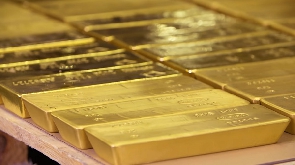 Gold is a key natural resource and export commodity for Ghana
Gold is a key natural resource and export commodity for Ghana
Vice President Dr Mahamudu Bawumia has pledged to deploy initiatives and policies that will increase Ghana’s benefits from its natural resources when elected President.
Over the years, it has emerged that though Ghana is endowed with natural resources such as gold, Lithium, Bauxite and Oil, the state does not rip significant benefits from the exploration of the resources owing to unfavourable policies and arrangements.
Recently, the introduction of the Gold-4-Oil program and the Synohydro arrangements through the Vice President were meant to leverage the natural resources for the development of key sectors such as roads, fuel affordability and the stabilisation of the Ghana cedi.
Addressing jubilant party supporters after filing his presidential nomination forms to contest the upcoming presidential primaries of the NPP, Dr Bawumia envisioned a Ghana “Where we maximize the benefits from our natural resources like gold and lithium through policies like, value addition, setting up an LBMA certified gold refinery, enhancing the gold for oil policy, and dedication of specific gold concessions to the Bank of Ghana to enhance their accumulation of gold reserves”.
According to him, notwithstanding the global economy, the government has constructed more infrastructure than any other government in the fourth republic and many transformational policies have been introduced for the first time in our history, including the Ghanacard, Digital Address, Mobile Money Interoperability, Delivery of medicines by drones, One District One Factory, Planting for Food and Jobs, Zongo Development Fund, Agenda 111, Free TVET and Free SHS to mention a few. We have also created 2.1 million jobs in six years, more than any government in the fourth republic.
In outlining his vision for Ghana when elected President, he disclosed that “I also have my own vision for Ghana. I believe that it is time to move Ghana to the next level by building on the foundations we have put in place so far”.
Ghana (formerly Gold Coast) has remained a major gold producer in the world and the number one producer in the African continent. It is, however, strange that for such a world producer of gold, Ghana cannot boast of an LBMA-certified gold refinery. In Africa, the only LBMA-certified gold refinery is the Rand Refinery in South Africa. Ghana is, thus, well positioned to have its own LBMA-certified refinery to serve the rest of the gold-producing countries in Africa and the West Africa sub-region.
Plans are far advanced for Ghana to realize this dream. The government under President Nana Akufo-Addo started an aggressive pursuit a year and a half ago to increase the gold reserves in Ghana and today, the Bank of Ghana has increased its vault of gold reserves from a paltry 8 tonnes in over sixty-five years to over 15 tonnes in one and half years.
As the government seeks to increase its gold-for-oil arrangement and secure a gold mining concession for the Bank of Ghana in order to increase its gold reserves to improve its stock of international reserves and balance of payments position, it is very prudent for the country to have an LBMA certified gold refinery to maximize the full benefits.
Already, the government in public-private partnership arrangements has established a gold refinery, and it is expected that this should enhance Ghana’s gold value addition dream by getting LBMA certification for the existing gold refinery, the Royal Ghana Gold (RGG) refinery.